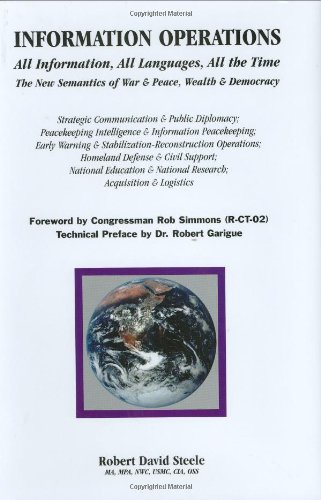My personal view is that the key points of the book are that:
• inter-agency sharing of non-secret information is much more important than precision delivery of secrets to the top guy;
• unclassified information on operations, logistics, beliefs, etc. is much more important that technical secret information; and
• there is a larger process called "Information Operations" (IO) that has been mis-defined in the US as offensive cyberwar and PSYOP on steroids, which in fact deals with
• the full and constant integration of global coverage in all languages all the time (including historical and cultural knowledge at the neighborhood level);
• the technologies of sharing, translating, and understanding; inclusive of online video gaming; and
• the crafting of inter-agency BEHAVIOR and BUDGETS (means) in order to achieve useful ends.
In short, it's not about secret intelligence; it is about global awareness and ethical behavior done across all the instruments of national power, wisely. As Dr. Cambone demands, we need universal coverage, 24/7, at sub-state levels of granularity, but we also need to act on that information in a timely as well as ethical manner, utilizing all of our resources, not just our military, and harmoniously integrating our intelligence and operational activities with those of other legitimate governments and non-governmental organizations.
Robert David Steele Vivas is today the CEO of OSS.Net, Inc., a veteran-owned small business incorporated in the Commonwealth of Virginia. Since 1988 he has focused on the need to reinvent intelligence by first establishing the separate discipline of Open Source Intelligence (OSINT), and then by focusing on sense-making through a new craft of intelligence that fully integrates history, culture, and all that can be known or intuited by the "seven tribes." Born in New York, he spent 20 years overseas as the son of an oilman, half in Latin America, half in Asia including four years in Viet-Nam. He completed his undergraduate education at Muhlenberg College, specializing in political science, with a thesis on home-host country issues with multinational corporations. His first graduate degree is from Lehigh University, specializing in international affairs, with a mini-thesis on the origin and purpose of the state, and a graduate thesis on predicting and analyzing revolution. Steele joined the United States Marine Corps in 1974, serving on active duty as an infantry officer including a Marine Expeditionary Force deployment (32 ships) during which he served as S-1/Adjutant for a 1,500 man Battalion Landing Team. Joining the Central Intelligence Agency (CIA) in 1979, he went through accelerated training and served three back-to-back tours in Latin America as a clandestine case officer, including one tour as one of the first officers focused full-time on terrorism. He returned to serve three Headquarters tours in counterintelligence, advanced information technology and advanced technical (satellite) program evaluation. While in the CIA, he completed a second graduate degree with the Extension Program of the University of Oklahoma, specializing in public administration, with a thesis on strategic and tactical information management issues for national security. He also completed the Naval War College non-residence program, earning a diploma with distinction. Having remained a Reserve officer with twice annual active duties as a Tactical Exploitation of National Capabilities (TENCAP) specialist, he helped draft the Marine Corps Intelligence Plan (MCMIP). Invited to resign from the CIA, he became the founding Special Assistant and concurrently the Deputy Director of the Marine Corps Intelligence Command (then Center). He wrote the first official appeal for a national OSINT program in 1988, and spent four years trying to heal national intelligence from the inside, finally resigning on 1 April 1992 to campaign independently. He is the author of three books, ON INTELLIGENCE: Spies and Secrecy in an Open World; THE NEW CRAFT OF INTELLIGENCE: Personal, Public, & Political; and INFORMATION OPERATIONS: All Information, All Languages, All the Time. He is also a contributing editor of PEACEKEEPING INTELLIGENCE: Emerging Concepts for the Future. His next book will define the remainder of his life and is tentatively entitled INFORMATION PEACEKEEPING: Empowering the Poor to Save the World. As a hobby, he reads, and is the #1 Amazon reviewer for non-fiction books about national security and global issues.
